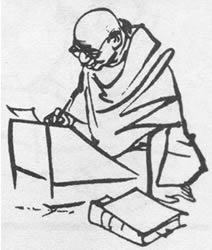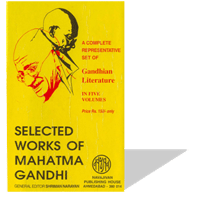
P.O. SEVAGRAM, DIST.WARDHA 442102, MS, INDIA. Phone: 91-7152-284753
FOUNDED BY MAHATMA GANDHI IN 1936
SECTION I : Selected Letters
[ from Selected Works of Mahatma Gandhi : Vol - 4 ]

SELECTED LETTERS
from
Selected Works of Mahatma Gandhi
Volume IV
Table of Contents
- Foreword
- Publisher's Note
SECTION I : LETTERS
- 1. To Dadabhai Naoroji
- 2. To G. K. Gokhale
- 3. To G. K. Gokhale
- 4. To Tolstoy
- 4A. From Count Leo Tolstoy
- 5. To Count Leo Tolstoy
- 6. To Leo Tolstoy
- 6A. From Count Leo Tolstoy
- 7. To Leo Tolstoy
- 7A. From Count Leo Tolstoy
- 8. To Maganlal Gandhi
- 9. To Maganlal Gandhi
- 10. To Narhar Shabhurao Bhave
- 11. To Mr Maffey, Private secretary To Viceroy
- 12. To W. B. Heycock
- 13. To Shankarlal on Ideas About Satyagraha
- 14. To Vinoba Bhave
- 15. To C F Andrews
- 16. To C F Andrews
- 17. To C F Andrews
- 18. To Kasturba Gandhi
- 19. To Kishorelal Mashruwala
- 20. To Sarojini Naidu
- 21. To Srinivas Sastri
- 22. To Srinivas Sastri
- 23. To Rabindranath Tagore
- 23A. From Rabindranath Tagore
- 24. To Rabindranath Tagore
- 25. From Rabindranath Tagore
- 25A. To Rabindranath Tagore
- 26. From Rabindranath Tagore
- 26A. To Rabindranath Tagore
- 27. To Rabindranath Tagore
- 28. To Rabindranath Tagore
- 29. To Rabindranath Tagore
- 30. To Rabindranath Tagore
- 31. To Rabindranath Tagore
- 32. From Rabindranath Tagore
- 32A. To Rabindranath Tagore
- 33. From G S Arundale
- 33A. To G S Arundale
- 34. To Every Englishman In India
- 35. To Viceroy
- 36. To Jawaharlal Nehru
- 37. To Jawaharlal Nehru
- 38. To Jawaharlal Nehru
- 39. To Jawaharlal Nehru
- 40. From Jawaharlal Nehru
- 41. To Jawaharlal Nehru
- 42. To Konda Venkatappayya
- 43. To T Prakasam
- 44. To Hakim Ajmal Khan
- 45. To Jamnalal Bajaj
- 46. To Mohomed Ali
- 47. To Motilal Nehru
- 48. To Motilal Nehru
- 49. To C Rajagopalachari
- 50. To C Rajagopalachari
- 51. To Kakasaheb Kalelkar
- 52. To A Friend
- 53. From Madeleine Slade or Miraben
- 53A. To Madeleine Slade
- 54. To Romain Rolland
- 55. To Romain Rolland
- 56. To Shri Shankaran
- 57. To Hermann Kallenbach
- 58. To Gulzarilal Nanda
- 59. To Dr Kailas Nath Kaju
- 60. To Dhan Gopal Mukherjee
- 61. To Henry S Salt
- 62. To The Viceroy
- 63. To Lord Irwin
- 64. To Reginald Reynolds
- 65. To Richard B Gregg
- 66. To Sir Samuel Hoare
- 67. To Ramsay MacDonald
- 68. To Pandit Malaviyaji
- 69. To The Secretary To The Government of Bombay, (Home Dept.), Poona
- 70. To Sir Tej Bahadur Sapru
- 71. To Carl Heath
- 72. To Carl Heath
- 73. To Carl Heath
- 74. To M A Jinnah
- 75. To M A Jinnah
- 76. To M A Jinnah
- 76A. From M A Jinnah
- 77. To M A Jinnah
- 78. From Subhash Chandra Bose
- 78A. To Subhash Chandra Bose
- 79. To Herr Hitler
- 80. To Every Briton
- 81. To Every Briton
- 82. To Generalissimo Chiang Kai-Shek
- 83. To Every Japanese
- 84. To American Friends
- 85. To Lord Linlithgow
- 86. To Lord Linlithgow
- 86A. From Lord Linlithgow
- 87. To Lord Linlithgow
- 87A. From Lord Linlithgow
- 88. To Lord Linlithgow
- 88A. From Lord Linlithgow
- 89. To Lord Linlithgow
- 90. To Agatha Harrison
- 91. To Winston Churchill
- 92. To Shriman Narayan
- 93. To Lord Pethick Lawrence
- 94. To Sardar Vallabhbhai Patel
- 95. To The Viceroy
- 96. To The Viceroy
- 96A. From Lord Mountbatten
- 97. To Abdul Ghaffar Khan
- 97A. From Abdul Ghaffar Khan
- 98. To A Friend
- 99. To Madame Edmond Privat
- 100. To The People of Gujarat
- Appendix I: Who Should Be Provincial Governors?
- Appendix II: A Psychological Explanation
- Appendix III: The Gandhian Constitutions for Free India
SECTION II : EXTRACTS FROM LETTERS
- Faith in God
- Religions and Scriptures
- Value of Prayer
- Truth and Non-violence
- The Science of Satyagraha
- Fasting in Satyagraha
- Unto This Last
- Khadi and Village Industry
- East and West
- Hindu-Muslim Unity
- Upliftment of Women
- The Good of All
- India's Freedom
- Education
- Caste System and Untouchability
- Brahmacharya
- Fearlessness
- Health and Hygene
- Self-restraint
- Self-development
- Selfless Service
- Voluntary Poverty
About This Volumes

Selected Works of Mahatma Gandhi comprises of Five volumes.
- Vol-I: Autobiography
- Vol-II: Satyagraha in South Africa
- Vol-III: Basic Works
- Ethical Religion
- Unto This Last
- Hind Swaraj or Indian Home Rule
- From Yeravada Mandir
- Discourses on the Gita
- Constructive Programme
- Key to Health
- Vol-IV: Selected Letters
- Vol-V: Voice of Truth
This book, Selected Letters, is volume-4.
Written by : M. K. Gandhi
General Editor : Shriman Narayan
Volume
Selected Works of Mahatma Gandhi : A set of five books
ISBN: 81-7229-278-3 (set)
Printed and Published by :
Jitendra T. Desai
Navajivan Mudranalaya,
Ahemadabad-380014
India
© Navajivan Trust, 1968
Download
Gandhi Letter 9 : To Maganlal Gandhi
Navagam,
Thursday [July 25, 1918]
CHI. MAGANLAL,
You have been frightened by Raojibhai as he was by me. He read too
much into my words.
No, my ideals have not changed. Despite my bitter experiences in India,
my conviction remains the same as ever, that we have but little to
learn from the West. The evils I have seen here have made no change
in my fundamental idea nor has this war. The old idea has developed
into something purer. I have certainly not come to feel that we shall
have to introduce Western civilization. Nor do I suppose that we shall
have to take to drinking and meat-eating. To be sure, I have felt,
in all seriousness, that Swaminarayana1 and Vallabhacharya2 have robbed
us of our manliness. They made the people incapable of self-defence.
It was all to the good, of course, that people gave up drinking, smoking,
etc.; this, however, is not an end in itself, it is only a means.
If a smoker happens to be a man of character his company is worth
cultivating. If, on the contrary, a man who has never smoked in his
life is an adulterer, he can be of little service. The love taught
by Swaminarayana and Vallabh is all sentimentalism. It cannot make
one a man of true love. Swaminarayana and Vallabh simply did not reflect
over the true nature of non-violence. Non-violence consists in holding
in check all impulses in the chitta3. It comes into play especially
in men's relations with one another. There is not even a suggestion
of this idea in their writings. Having been born in this degenerate
age of ours, they could not remain unaffected by its atmosphere and
had, in consequence, quite an undesirable effect on Gujarat. Tukaram
and Ramdas had no such effect. The Abhangas4 of the former and the
shlokas5 of the latter admit ample scope for manly striving. They,
too, were Vaishnavas. Do not mix up the Vaishnava tradition with the
teaching of Vallabh and Swaminarayana. Vaishnavism is an age-old truth.
I have come to see, what I did not so clearly before, that there is
non¬violence in violence. This is the big change which has come
about. I had not fully realized the duty of restraining a drunkard
from doing evil, of killing a dog in agony or one infected with rabies.
In all these instances, violence is in fact non-violence. Violence
is a function of the body. Brahmacharya6 consists in refraining from
sexual indulgence, but we do not bring up our children to be impotent.
They will have observed brahmacharya only if, though possessed of
the highest virility, they can master the physical urge. In the same
way, our offspring must be strong in physique. If they cannot completely
renounce the urge to violence, we may permit them to commit violence,
to use their strength to fight and thus make them non-violent. Non¬violence
was taught by a Kshatriya7 to a Kshatriya.
The difference between the West and the East is what I have explained
to be, and it is a great one. The civilization of the West is based
on self-indulgence, ours on self-control. If we commit violence, it
will be as a last resort and with a view to lokasangraha8. The West
will indulge in violence in self-will. My taking part in (the movement
for) a Parliament and similar activities is not a new development;
it is quite an. old thing and is only intended to ensure a check on
these bodies. You will see this if you read my article on Mr Montagu's
scheme. I simply cannot bring myself to take interest in the movement,
but I can spread my ideals by working in it. When I saw that I could
continue in it only by sacri¬ficing my ideals, I decided to retire
from the movement.
I think you have your reply in what I have said. I cannot explain
much when I am there for a day and so I have set down the thing in
writing. This will enable you to think and ask me questions, if fresh
doubts occur to you.
I continue to be in Navagam. I wanted to leave from here today, but
perhaps I may not be able to do so.
Blessings from,
BAPU
Collected Works of Mahatma Gandhi, Vol. XIV PP- 504-5
- The Vishnava sect whose founder was Swami Sahaja- nand (1781-1833).
- Vallabhacharya (1473-1531)—Religious Teacher, princi¬pally responsible for spreading the Bhakti cult in Gujarat.
- Mind
- Devotional metrical composition in Marathi Poetry
- Devotional Metrical verse or composition
- Continence. Literally, conduct that leads one to God.
- A member of the military or second caste among Hindus
- That which promotes the conservation of society.